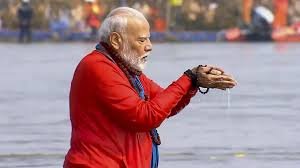New Delhi (March 18, 2025):
In a powerful address to the Lok Sabha, Prime Minister Narendra Modi described Mahakumbh as a moment of national awakening, drawing parallels between the grand religious gathering and some of India’s most iconic historical events, such as the Dandi March, Swami Vivekananda’s Chicago Speech, and the construction of the Ram Mandir in Ayodhya.
PM Modi highlighted that the Mahakumbh Mela, held every 12 years, is not merely a religious event but a reflection of India’s cultural strength, unity, and devotion.
“Mahakumbh is not just a festival; it is a movement led by the people, driven by their resolve, and inspired by their unwavering devotion,” he said, emphasizing its significance in shaping India’s spiritual and cultural identity.
Mahakumbh: A Symbol of People’s Power and National Pride
Speaking passionately about the historic importance of Mahakumbh, Modi compared it to pivotal moments in India’s history that played a role in national revival and awakening:
- Dandi March (1930): A turning point in the Indian freedom movement, where Mahatma Gandhi’s Salt March ignited mass civil disobedience against British rule.
- Swami Vivekananda’s Chicago Speech (1893): A defining moment that introduced Indian spirituality and Hindu philosophy to the global stage, inspiring national pride.
- Ram Mandir Construction (2024): A historic milestone in India’s cultural and religious revival, uniting millions in devotion and reaffirming their faith.
PM Modi emphasized that Mahakumbh carries the same spirit, as it is an expression of India’s spiritual strength, with millions of devotees gathering in prayer, faith, and unity.
A Global Phenomenon Rooted in Devotion
The Mahakumbh Mela considered the largest religious gathering in the world, brings together millions of pilgrims, saints, and spiritual seekers from across India and beyond. The scale of participation and the collective spiritual energy of Mahakumbh, Modi said, represents the soul of India, where devotion becomes a force of national unity and strength.
“Mahakumbh is proof of how a deeply spiritual society can shape a nation’s destiny,” Modi stated. “It is an event that transcends religion and reflects the very essence of Bharat—unity in diversity, strength in faith, and determination in action.”
Government’s Role in Supporting the Grand Event
While addressing the Lok Sabha, PM Modi also underlined the government’s efforts in ensuring a well-organized, clean, and seamless Mahakumbh. The administration has worked on:
- Enhancing infrastructure, sanitation, and transport facilities to accommodate the millions of devotees.
- Ensuring smooth crowd management and safety measures, making it an inclusive and accessible event.
- Promoting Mahakumbh as a global spiritual tourism attraction, encouraging people from across the world to witness India’s cultural grandeur.
The Significance of Mahakumbh in the 21st Century
PM Modi noted that in today’s modern world, events like Mahakumbh serve as reminders of India’s rich spiritual heritage and cultural resilience. Just as the Dandi March awakened political consciousness, Vivekananda’s speech shaped India’s global identity, and the Ram Mandir reinstated cultural pride, the Mahakumbh unites millions in devotion and self-realization.
“India’s identity has always been rooted in faith, knowledge, and self-discipline. Mahakumbh is a living testament to our eternal traditions and collective consciousness.”
Conclusion: A Celebration of India’s Timeless Spirit
With the world looking at India as a rising power, PM Modi reaffirmed that cultural and spiritual traditions like Mahakumbh play a crucial role in shaping the nation’s destiny. By connecting the present generation with India’s historical consciousness, the event is more than just a religious gathering—it is a celebration of India’s eternal and evolving spirit.
As the Mahakumbh 2025 continues to unfold, the message from PM Modi’s speech remains clear: India’s cultural and spiritual heritage is not just its past—it is also its future.

